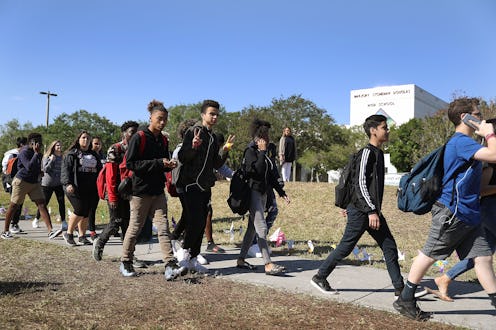News
Why People Think The Walk Up, Not Out Movement Is So Messed Up

The shooting at Marjory Stoneman Douglas High School in Parkland, Florida, left 17 dead and sparked numerous movements. While several of them have focused on ending gun violence through increased gun control, that can't be said of all of them. You might have been wondering what "Walk Up Not Out" means — and it is exactly one of those Parkland-sparked movements that attempts to turn the focus away from gun control.
According to the Indy Star, "Walk Up Not Out" sprung out of the ideas of a few people. One was a man named David Blair, who said that he had taught middle and high school for 24 years. Blair's post began:
Do you really want to make a difference? Are you sincere about making your schools safe? Don’t walk out, read this instead. Walking out of school is easy compared to what this letter will challenge you to do.
It then names various types of students who could become "our next shooter" and then challenges readers to go include those types of kids in their lives. The gist of it was that in order to stop school shootings, students only need to be nicer to each other — particularly to outcasts.
"Gun control or more laws is not, and will not, be the answer. You are the answer," Blair wrote on Facebook. "Your greeting, your smile, your gentle human touch is the only thing that can change the world of a desperate classmate who may be contemplating something as horrendous as a school shooting."
A woman named Kelly Guest posted on Facebook and then again on CatholicMom.com, articulating the same idea. "Instead of walking out of school on March 14, encourage students to walk up," Guest wrote, putting the Walk Up Not Out movement directly at odds with the National School Walkout.
Middle school teacher Jodie Katsetos wrote the message on a poster board, which swiftly went viral online, that listed four ways to "walk up" to someone instead of walking out.
There are numerous criticisms of Walk Up Not Out as a movement. A frequent comment is that it's essentially blaming the victims by insinuating that if the students had only been nicer to the shooter, the shooting might never have happened. It also rests on the claim that all school shooters are loners — and that all loners have the potential to be school shooters.
Neither of those claims are true. According to a fact sheet about the profile of a school shooter from the FBI and the National Center for the Analysis of Violent Crime, while many shooters do fit the profile of a loner, or someone who has trouble relating to society, there are also plenty of high school students who are simply introverted.
A Facebook commentator also pointed out that, in some cases, it means asking kids to attempt to befriend a person around whom they don't feel comfortable. "We're encouraging them to ignore their intuition and to see it as their responsibility to somehow be so kind as to defeat the rage of people who mean to harm them," she wrote. "We make their safety something they have to win through kindness, rather than something they have a right to expect."
Telling the students not to participate in the school walkouts, she went on, also has the effect of saying that individual actions are more powerful than mass, civic movements — which has not proven to be true. "We are defeating young people's impulse toward civic action," she wrote. "We're telling them that systemic solutions are less powerful than individual ones, which simply isn't the case."
Students will be able to make their own choices, of course, and there's no telling what might be accomplished if more students made an effort to befriend the people in their schools who aren't so well socially connected. However, the mass walkouts are at least likely to draw more attention — and their potential for change is also significant.